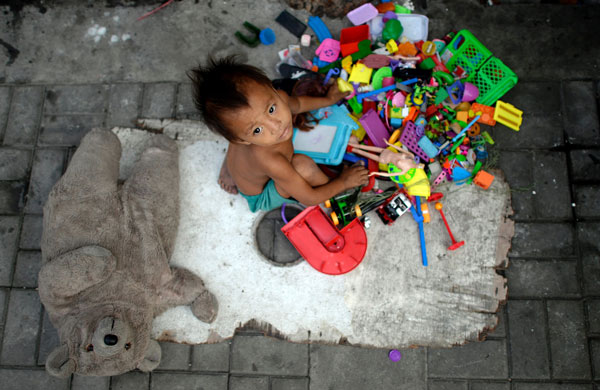Richest 62 people own same as half world's population - Oxfam
Updated: 2016-01-18 10:47
(Agencies)
|
||||||||
EXTREME POVERTY FALLING
 |
|
A homeless boy plays with different toys collected by his parents that picks used plastic soda bottles to sell at junk shops in Manila on Jan 13, 2016. [Photo/CFP] |
The number of people living in extreme poverty has fallen by 650 million since 1981, even though the global population grew by 2 billion in that time, according to the Organisation for Economic Co-operation and Development (OECD).
Much of this change has been because of the rise of China, which alone accounted for half a billion people moving out of extreme poverty.
Most of the world's poorest no longer live in the poorest countries, but in middle-income countries like India, the OECD said in a recent report.
The inequalities are partly to do with differences in income, especially between urban and rural areas, but also differences in access to healthcare, education and jobs, the OECD said.
"The figures suggest that the biggest causes of poverty are ... political, economic and social marginalisation of particular groups in countries that are otherwise doing quite well," development economist Owen Barder is quoted as saying in the OECD report.
Barder is director for Europe at the Center for Global Development.
Although taxes and transfers help reduce income inequality in developed countries, these systems are less robust in many developing countries, according to the OECD.
An exception is Brazil, which makes payments to more than 13.3 million poor families on condition they enrol children in school and take part in health programmes.
"That has helped to reduce rates of both child poverty as well as inequality," the OECD report said.
- A glimpse of Spring Rush: little migrant birds on the way home
- Policy puts focus on genuine artistic students
- Police unravel market where babies are bought, sold as commodities
- More older pregnant women expected
- Netizen backlash 'ugly' Spring Festival Gala mascot
- China builds Mongolian language corpus
- 2 Chinese nationals killed, 1 injured in suspected bomb attack in Laos
- New York, Washington clean up after fatal blizzard
- 'Plane wreckage' found in Thailand fuels talk of missing Malaysian jet
- Washington shuts down govt, NY rebounds after blizzard
- 7 policemen, 3 civilians killed in Egypt's Giza blast
- Former US Marine held in Iran arrives home after swap

 Drone makers see soaring growth but dark clouds circle industry
Drone makers see soaring growth but dark clouds circle industry China's Zhang reaches Australian Open quarterfinals
China's Zhang reaches Australian Open quarterfinals
 Spring Festival in the eyes of Chinese painters
Spring Festival in the eyes of Chinese painters
 Cold snap brings joy and beauty to south China
Cold snap brings joy and beauty to south China
 The making of China Daily's Tibetan-style English font
The making of China Daily's Tibetan-style English font
 First trains of Spring Festival travel depart around China
First trains of Spring Festival travel depart around China
 Dough figurines of Monkey King welcome the New Year
Dough figurines of Monkey King welcome the New Year
 Ning Zetao, Liu Hong named China's athletes of the year
Ning Zetao, Liu Hong named China's athletes of the year
Most Viewed
Editor's Picks

|

|

|

|

|

|
Today's Top News
National Art Museum showing 400 puppets in new exhibition
Finest Chinese porcelains expected to fetch over $28 million
Monkey portraits by Chinese ink painting masters
Beijing's movie fans in for new experience
Obama to deliver final State of the Union speech
Shooting rampage at US social services agency leaves 14 dead
Chinese bargain hunters are changing the retail game
Chinese president arrives in Turkey for G20 summit
US Weekly

|

|







